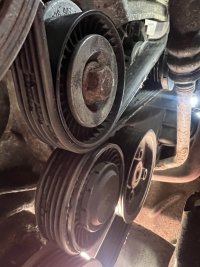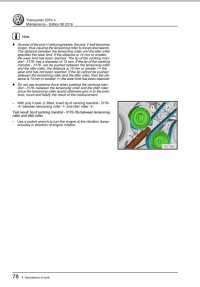You are using an out of date browser. It may not display this or other websites correctly.
You should upgrade or use an alternative browser.
You should upgrade or use an alternative browser.
Renewal of Auxiliary Drive Belt - When ?
- Thread starter T6WOLF
- Start date
-
- Tags
- auxiliary belt cam belt
There is no fixed interval, if you want a labour free renewal do it at the same time as the timing belt / water pump kit renewal.
Note there is a debatable interval on the timing belt renewal in the UK, use Search and ‘cam belt’.
In addition check the smart ‘bluemotion’ alternator pulley clutch while the aux’ belt is removed.
EDIT: just so your’re aware if the aux’ belt breaks it CAN wrap up in the crank pulley, break the lower timing belt cover and break the timing belt which will result in catastrophic engine damage.
A classic case of a high value piece of machinery with the maintenance regime of a food mixer.
Note there is a debatable interval on the timing belt renewal in the UK, use Search and ‘cam belt’.
In addition check the smart ‘bluemotion’ alternator pulley clutch while the aux’ belt is removed.
EDIT: just so your’re aware if the aux’ belt breaks it CAN wrap up in the crank pulley, break the lower timing belt cover and break the timing belt which will result in catastrophic engine damage.
A classic case of a high value piece of machinery with the maintenance regime of a food mixer.
Last edited:

Fan belt AND timing belt damage
I've a 2019 204ps dsg 4motion kombi with 11000 miles. Bought it cash this summer with 9000 on. Dropped off the kids for school and headed on to the a41 dual carriageway. Everything felt and sounded normal then all of a sudden there was a jolt and the engine seemed to just cut out, power...
I was surprised when VW Wooburn Green replaced my Aux belt under warranty at 3 years/14,000 miles - almost the same time as dah78’s van went in?
I will probably replace again at 8 year timing belt change.
MrOrk
Member
On my van 2010 t5.1 2.0tdi 102, the old belt has stretched so much the tensioner pulley was just about touching the idler pulley, causing the belt to rub on itself. I’m guessing this shouldn’t happen, there is a restrictor bump stop on the tensioner but it doesn’t stop it in time. Anyone else had this happen? Cheers


MrOrk
Member
Great info, but does the fact the tensioner fouls the idler pulley indicate there is a problem?
Yes, it means the belt is seriously wornGreat info, but does the fact the tensioner fouls the idler pulley indicate there is a problem?
Change it ASAP
MrOrk
Member
Oh it’s changed. What I’m trying to say is, I wouldn’t have thought that by design a worn belt would allow the tensioner to touch the idler. Surly the tensioners travel should stop before that happens?Yes, it means the belt is seriously worn
Change it ASAP
The belt should not get that worn that the tensioner does make contact. If the tensioner travel was restricted, you'd probably have the belt shedding, possibly with further damage.Oh it’s changed. What I’m trying to say is, I wouldn’t have thought that by design a worn belt would allow the tensioner to touch the idler. Surly the tensioners travel should stop before that happens?
MrOrk
Member
I agree, it shouldn’t be left that long.The belt should not get that worn that the tensioner does make contact. If the tensioner travel was restricted, you'd probably have the belt shedding, possibly with further damage.
I think the belt shedding would probably be better than catastrophic failure when they touch.
One is closely followed by the other, you’re correct in highlighting it, just another easily avoidable design flaw, no surprise.I agree, it shouldn’t be left that long.
I think the belt shedding would probably be better than catastrophic failure when they touch.
Design engineers are often ‘too intelligent’ for their own good, there is a train of thought that following service intervals and procedures eliminates all failures.
MrOrk
Member
My reason for asking the question really was to check there wasn’t something else causing the pulleys to touch other than a stretched belt, ie idler pulley faulty. I was checking it wasn’t specific to my van because of another issue. No one’s really said they have had the same issue yet, just that my belt was overly worn.One is closely followed by the other, you’re correct in highlighting it, just another easily avoidable design flaw, no surprise.
Design engineers are often ‘too intelligent’ for their own good, there is a train of thought that following service intervals and procedures eliminates all failures.
It shows there a serious problem with servicing and inspection. The belt should never be allowed to wear anywhere near this much, so it's irrelevant whether the tensioner has a stop or not.Great info, but does the fact the tensioner fouls the idler pulley indicate there is a problem?
MrOrk
Member
So is the tensioner supposed to stop before fouling or not?It shows there a serious problem with servicing and inspection. The belt should never be allowed to wear anywhere near this much, so it's irrelevant whether the tensioner has a stop or not.
The point isn't relevant - with correct servicing it will not normally reach such a position.
MrOrk
Member
Yes, @oldiebut goodie that is well established by now, thank you, but, does the tensioner pulley travel so far as to foul the idler pulley ordinarily I wander?The point isn't relevant - with correct servicing it will not normally reach such a position.
Last edited:
Obviously yes in this case. If serviced, no. It cannot be put in plainer words. I don't see why you are labouring the point.
Similar threads
- Replies
- 5
- Views
- 903
- Replies
- 0
- Views
- 389

